Research
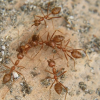 Studying emergent behavior has long fascinated engineers, and researchers at the University of Colorado Boulder just uncovered a distinct behavior in colonies of fire ants cooperating in flood situations.
Studying emergent behavior has long fascinated engineers, and researchers at the University of Colorado Boulder just uncovered a distinct behavior in colonies of fire ants cooperating in flood situations.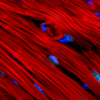 Professor Corey Neu explains how his team found that mechanical forces can reorganize the genetic material inside the nucleus of heart cells and affect how they develop and function.
Professor Corey Neu explains how his team found that mechanical forces can reorganize the genetic material inside the nucleus of heart cells and affect how they develop and function. New research published in Nature Materials from Associate Professor Tanja Cuk and colleagues sheds light on a fundamental chemical reaction — the breaking apart of water to produce a molecular fuel such as hydrogen. Cuk is faculty in the Department of Chemistry and the Materials Science and Engineering Program (MSE) and is a Fellow in the Renewable and Sustainable Energy Institute (RASEI).
New research published in Nature Materials from Associate Professor Tanja Cuk and colleagues sheds light on a fundamental chemical reaction — the breaking apart of water to produce a molecular fuel such as hydrogen. Cuk is faculty in the Department of Chemistry and the Materials Science and Engineering Program (MSE) and is a Fellow in the Renewable and Sustainable Energy Institute (RASEI).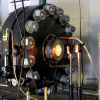 Professor Greg Rieker and Ryan Cole (PhDMechEngr’21) have developed an experiment that recreates the climates of planets beyond our solar system right in the lab. By reaching the same high-temperature and high-pressure conditions found on many exoplanets, the instrument can map their atmospheres, which could help humanity detect life outside our solar system.
Professor Greg Rieker and Ryan Cole (PhDMechEngr’21) have developed an experiment that recreates the climates of planets beyond our solar system right in the lab. By reaching the same high-temperature and high-pressure conditions found on many exoplanets, the instrument can map their atmospheres, which could help humanity detect life outside our solar system. Online image descriptions help people who are blind or have low vision easily access information every day. However, website developers and social media users often neglect the important task of creating alt text. It's a complex problem that CU Boulder alumnus Abigale Stangl has been working to untangle for years.
Online image descriptions help people who are blind or have low vision easily access information every day. However, website developers and social media users often neglect the important task of creating alt text. It's a complex problem that CU Boulder alumnus Abigale Stangl has been working to untangle for years.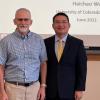 Haichao Wu of the Dan Schwartz Group is the winner of the College of Engineering and Applied Science’s 2021 Outstanding Dissertation Award for “Nanoparticle Tracking to Probe Transport in Porous Media.” This award is a recognition of the quality and excellence of Wu’s research as well as his presentation of the dissertation.
Haichao Wu of the Dan Schwartz Group is the winner of the College of Engineering and Applied Science’s 2021 Outstanding Dissertation Award for “Nanoparticle Tracking to Probe Transport in Porous Media.” This award is a recognition of the quality and excellence of Wu’s research as well as his presentation of the dissertation.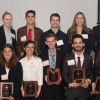 Students from the Department of Chemical and Biological Engineering presented their research as part of the competitive NC State University Future Leaders in Chemical Engineering symposium this past October. Three students from the department were recognized as awardees.
Students from the Department of Chemical and Biological Engineering presented their research as part of the competitive NC State University Future Leaders in Chemical Engineering symposium this past October. Three students from the department were recognized as awardees.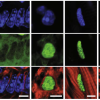 Biomedical Engineering Professor Corey Neu and Benjamin Seelbinder's (PhDMech’19) work, now published in Nature Biomedical Engineering, looks at how cells adapt to their environment and how a mechanical environment influences a cell. Their research has the potential to tackle major health obstacles.
Biomedical Engineering Professor Corey Neu and Benjamin Seelbinder's (PhDMech’19) work, now published in Nature Biomedical Engineering, looks at how cells adapt to their environment and how a mechanical environment influences a cell. Their research has the potential to tackle major health obstacles. Juan Carlos Tiznado (PhDCivEngr’20) is the lead author on a new paper in the Journal of Geotechnical and Geoenvironmental Engineering that helps engineers better understand and predict the “liquefaction” hazard during earthquakes and more reliably mitigate it.
Juan Carlos Tiznado (PhDCivEngr’20) is the lead author on a new paper in the Journal of Geotechnical and Geoenvironmental Engineering that helps engineers better understand and predict the “liquefaction” hazard during earthquakes and more reliably mitigate it. Danna Gurari, the founding director of the Image and Video Computing group in computer science, is part of a cross-institutional team that has been awarded over $1 million through a Safe and Trustworthy Cyberspace (SaTC) grant from the National Science Foundation to study the issue.
Danna Gurari, the founding director of the Image and Video Computing group in computer science, is part of a cross-institutional team that has been awarded over $1 million through a Safe and Trustworthy Cyberspace (SaTC) grant from the National Science Foundation to study the issue.

